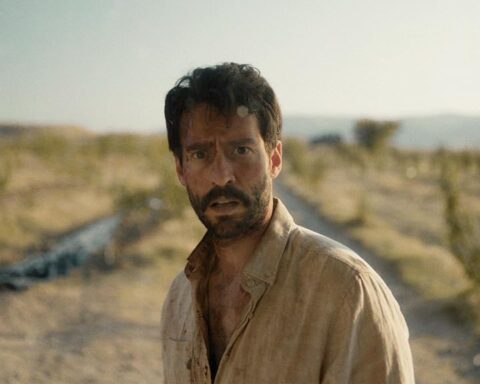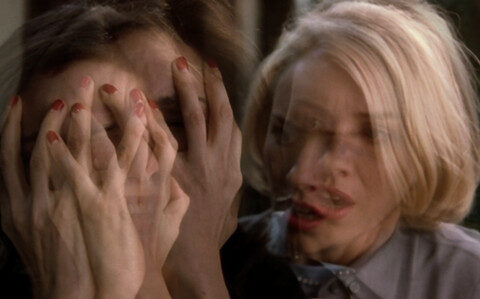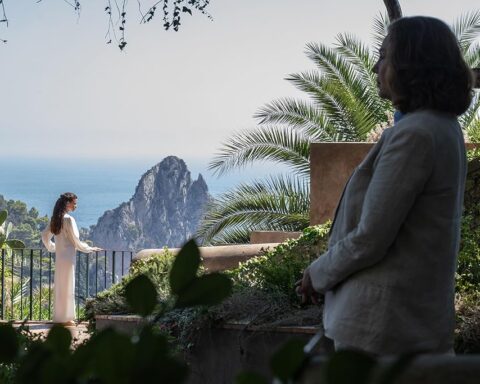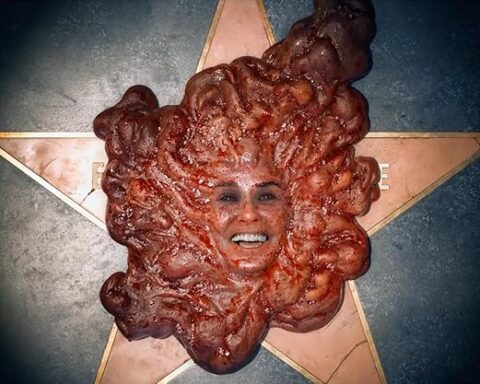Vortex (2021)
How can the feeling of death be most intensely conveyed to the screen?
1. With the visual masterpiece of Ozu in Tokyo Story, by stopping the life in the city completely, without showing the death itself
2. By crumpling the “square” it covers to white, setting the character free of volume and with a feeling of unlimited emptiness. Indeed, I’m talking about White on White. Now it’s time to end this euphoria with Malevich’s manifesto and return to the film: “I have overcome the lining of the colored sky. . . . Swim in the white free abyss, infinity is before you.”
**
“Life is a dream – life is a dream within a dream.” We are witnessing an old couple’s dream within a dream with the quote of Poe. When they are woken up by a black line falling on the screen above their beds in which they had lied down with happiness, peace and love, the Noé figurines makes its first signature. However, this will not be a movie that we will experience the classic Noé signatures, on the contrary, it is a very unexpected characteristic film of him due to the influence of his personal experiences (he almost passed away after a cerebral hemorrhage and continues his existence with the emphasis that he prefers now the positive side of the life; having lost his mother as well in a similar way*). Noé shocks us again in this sense, by reversing our “open-ended” expectations which he had built so far in his filmography, until this one really.
*” There are shifting points in your life. When your mother dies in your arms, your perception of life changes. I think the whole thing is just a fleeting illusion.”
The fact that the couple, who had experienced a happy life once, but now chooses different perspectives through the inevitable convergence to death, divides the screen into two; two parallel views / lives in the same universe, a magnificent visual metaphor in which the eroded lack of communication is reflected on the form. The melancholic transformation of a loving relationship into loneliness and alienation, but Noé leaves no room for agitation. They are now lost, drowning and fluttering helplessly in their flat, a claustrophobic labyrinth in Paris, crammed with the treasures of past experiences in the background. They sometimes cross paths and switch sides in their lives stuck to the split screen in which they are framed; however, the different perspectives that the characters have on the same situation will keep them apart until the inevitable end. When they get closer as a family, the two camera axes (although not exactly in line) are close to each other – the boundaries are violated with the outstretched arm (another Noé signature with the break of the axis, even this time he violates the frame he created himself). Yet the inevitable duality of their choice will sharply disrupt this union.
Noé clearly emphasizes that he wants to celebrate the duration of the film, time passes more slowly for the elderly, the dialogues get longer in this natural tempo and the details gain importance that requires a lot of patience. With this minimalistic preference of Ozu-like observing eyes and Akerman-like documentary camera, Noé makes his expectation from the audience pretty clear; it’s entirely the empathy for the characters and not an identification of one’s self.
In the marvelous reference to Dreyer’s Vampyr, lying in the coffin with dead, yet he continues to watch the world, just like our characters. Death itself is a journey and in the same place but in different dimensions, our characters are dragged into the vortex of death as a result of physical and mental degeneration in their inaction corrupted by the old age. The outcome is inevitable and action is as such unimportant.
We once again tip our hat to the Noé ‘s choice of the split screen technique, which drives the camera beyond the second dimension, as well as adds a different perspective to the film.
Although Vortex progresses in a completely separate line with his other films, Noé does not miss his signatures; the secret main character is again a grim reaper, the drug addict son is a character from any other movie that jumped into here and a screen blackout with a blink! Another talented technical signature.
What will remain of this dramatic dialectic in Noé’s latest film, which he dedicates to “those whose brains will rot before their hearts” – mind or heart? Another proof of Noé’s ability to see that he can make films without all of his provocative signatures, knowing he’ll get back to his own style (he mentioned himself) is exciting for us voracious fans!
Nil Birinci










